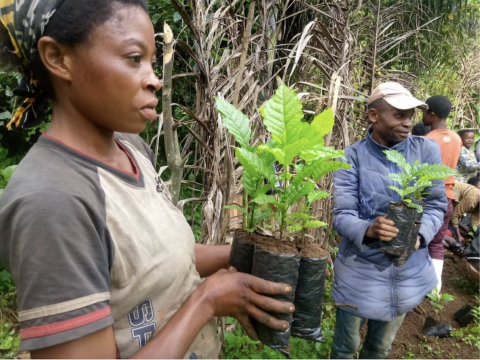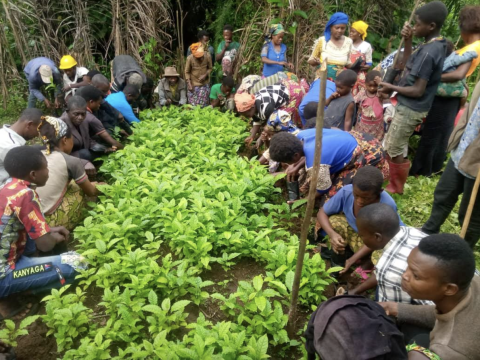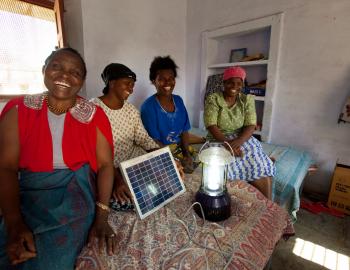Forests replanted after ‘anarchic’ logging of DRC’s edible caterpillar trees
Forests replanted after ‘anarchic’ logging of DRC’s edible caterpillar trees
In the Democratic Republic of Congo, edible caterpillars that feed on indigenous trees are a cherished snack, but deforestation threatens their habitat. Pilier aux Femmes Vulnérables Actives (PIFEVA), a local community-based organisation, supports vulnerable women to plant the host trees of edible caterpillars, empowering families and yielding economic benefits for the community. This story is part of a series celebrating the locally-led solutions supported by the UNDP implemented - Adaptation Fund Climate Innovation Accelerator programme.
Edible caterpillars are a popular snack in the Democratic Republic of Congo (DRC).
The caterpillars feed on indigenous trees, where locals commonly collect them to eat and to sell on to others as they are considered nutritious and tasty.
In Mwenga, in the South-Kivu province, however, logging has decimated the host trees of these edible caterpillars.
“Deforestation … is leading to biodiversity loss and negatively impacting the livelihoods of indigenous youth and women who depend on forest products,” says Veronique Bulaya, a project coordinator at local women’s community-based organisation PIFEVA.
PIFEVA stands for Pilier aux Femmes Vulnérables Actives, which translates from French to ‘Pillar for Vulnerable Women’.
The organisation supports indigenous women, marginalised women, children, young girls and local communities against injustice, poverty and climate change.
“The women who are in Mwenga where we are implementing our project live in a bad situation,” says Bulaya.
In this region of the DRC generally, wars have displaced people, and women and children have been exploited for mining and conflict. HIV/AIDS, hunger and violence are part of daily life.
And these hardships are exacerbated by “anarchic logging”, Bulaya says.
Her team has undertaken a reforestation project in which they work, particularly with indigenous women and girls, to plant the host trees of edible caterpillars. She says they are helping women cultivate trees and pride in themselves, which will ultimately yield economic benefits for their families.

Their goal is to restore 440 hectares of edible caterpillar trees in 22 villages where forests are overexploited. Over 600 indigenous youth and women, plus over 4000 family members who potentially depend on them, stand to benefit.
This particular PIFEVA project is funded by the Adaptation Fund and European Union, which support climate innovation in developing countries through the UNDP-Adaptation Fund Climate Innovation Accelerator (AFCIA).
Human activities that drive climate change, such as destroying forest ecosystems, often impact marginalised people in developing countries the most. And yet, says Bulaya, these people are often the best equipped to safeguard local ecosystems.
“Indigenous, traditional and local knowledge systems constitute one of the largest bodies of human knowledge on biodiversity and ecosystems in the face of climate change. However, these knowledge systems are rarely recognised as resources for understanding, monitoring and managing biodiversity,” she explains in a recent project report.
Her team has drawn on this local knowledge to identify the correct traditional forest tree species that will attract the edible caterpillar moths to lay their eggs.
Next, they set up edible caterpillar tree nurseries and provided training on managing the nurseries.

They also campaigned for reforestation in forest blocks within targeted villages, building the capacity of locals to monitor the forests and manage the caterpillars for income-generation.
Bulaya says they are helping the beneficiaries to establish a production cooperative for the conservation and sale of the caterpillars, which should be possible within six years when the new trees reach maturity.
Unfortunately, throughout these activities, her team encountered gender-based obstacles.
“In Mwenga territory, the right of access to land is not guaranteed for indigenous and local women and young girls,” she reports. This is because customary norms dictate that the control and management of lands and forests are reserved for men and boys.
“In addition, women in Mwenga could not decide, or be associated with traditional forest management meetings. But also, certain tasks, such as the creation of nurseries and plant cuttings were tasks largely reserved for women,” says Bulaya.
Her team however ensured that many women had decision-making power and ownership of the community forest blocks. She views this as a positive indicator that the project helped reduce inequalities and strengthened the inclusion of traditionally marginalised groups.
While they wait for the edible caterpillar trees to mature over the next six to seven years, the community is supplementing their incomes by cultivating and selling vegetables that grow quickly, including tomatoes and carrots.
But perhaps one of the biggest benefits of the project so far is that people have become keenly aware that it is important to preserve and restore their natural heritage and biodiversity, says Bulaya.
“The indigenous women and men of Mwenga have naturally adopted a sustainable lifestyle,” she says. “They have given up deforestation … and have embraced and applied the entire project … for forest management. Each time an individual cuts down a tree, he plants 10 others.”
Bulaya says it has become clear during their various projects in the region that forest restoration indeed restores the ecosystem services that people depend on, and also helps restore the structure and function of degraded ecosystems. “Measures such as agroforestry reduce the pressure on forests,” she says.
But her work in Mwenga is not yet done.
She says that given the immensity of the need that the majority of the indigenous population has, they’ve already identified more than 20 other villages that could also benefit from a similar intervention.
About this article
This story has been co-created with the support of PIFEVA, UNDP, CDKN, ICCCAD, and GRP, under the framework of the UNDP-managed Adaptation Fund Climate Innovation Accelerator (AFCIA).
The UNDP-AFCIA programme counts on financial contributions from the Adaptation Fund and the European Union and has awarded 44 micro and small grants to locally-led organisations across 33 countries worldwide, accelerating their innovative solutions to build resilience in the most vulnerable communities.
UNDP-AFCIA, is one of the funding windows anchored under the Adaptation Innovation Marketplace (AIM), a multi-stakeholder strategic platform that promotes scaled-up adaptation at the local level, launched by UNDP Administrator Achim Steiner at the Climate Adaptation Summit in January 2021.

